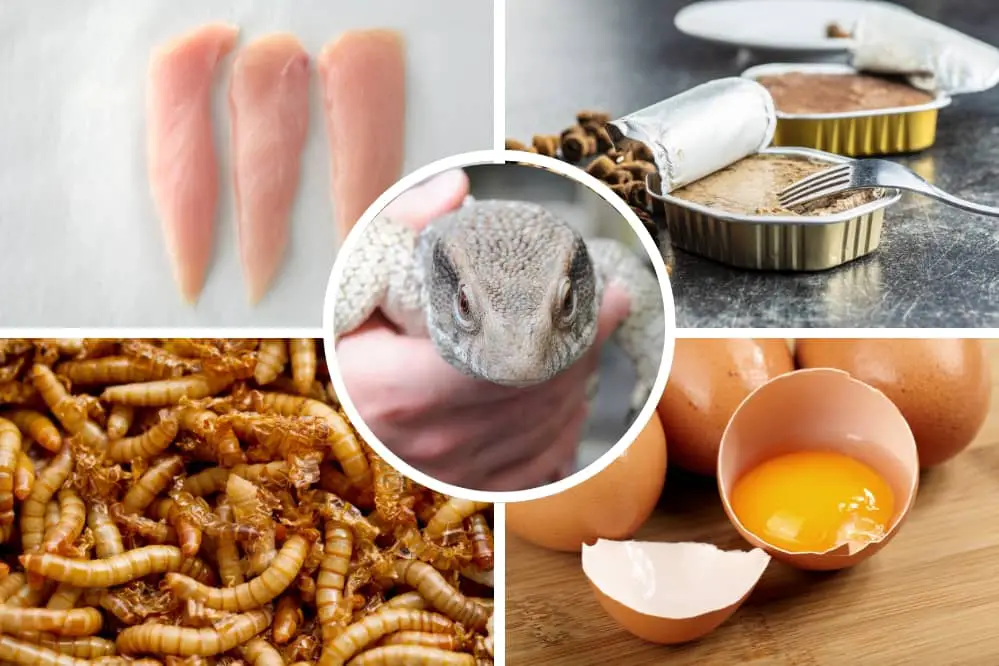In wild, savannah monitors are carnivorous therefore adult monitors diet consist of bird, smaller reptile, frogs, julus millipedes , carrion and so on while young savannah monitors feed on snails, slugs, grasshoppers, earthworms, cockroaches, crickets and other invertebrates. Juvenile savannah diet will include small vertebrates as they grow older.
In their natural habitat, savannah monitor’s dietary requirement is met by eating food available to them in nature. In captivity, it is our responsibility to provide them with balance diet that does not compromise their nutritional need. We should be aware of not just “what to feed” but also “how much to feed”. It is varied food items in varied proportions that constitute a balance diet.
In this post we will look into what can be fed to your pet savannah monitor.
Can Savannah Monitors Eat Raw Meat?
As mentioned before savannah monitors are carnivorous so they can definitely eat raw meat.
However, raw meat should be not be the main diet of savannah monitor because it lacks mineral and vitamins required by them. Only provide raw meat as supplement to other food.
To overcome lack of mineral and vitamin content, you should sprinkle either multi-mineral or vitamin supplement over raw meat before feeding it to savannah monitor.
Can Savannah Monitors Eat Canned Cat Food or Dog Food?
Savannah monitors can eat canned cat food or dog food but it is not a healthy option for them. Eating too much of canned food can result in obesity in savannah monitor. If you are wondering ‘how often’ to feed. That will depend on your savannah monitor. If you observe, your monitor getting fat then reduce the portion and feeding frequency.
Obesity in captive savannah monitor is a quite common occurrence because they have tendency to eat more than they need to. Therefore, seasoned savannah monitor owners suggest to leave them slightly underfed than overfed.
Early death and infertility are some of the issues associated with obese savannah monitor.
Can Savannah Monitors Eat Raw Eggs?
Raw eggs are a good source of protein. In wild savannah monitors have been observed sometimes eating eggs of other species and their own kind. So you can feed them eggs in captivity too; however, don’t feed them often. It is fine to give them an egg occasionally.
Can Savannah Monitors Eat Raw Chicken?
Chicken is great for savannah monitor because it contains various essential nutrients, mineral and vitamins: all the necessary factors for balance diet. But instead of raw, you should give them whole dead chicken (with bones and feathers).
Can Savannah Monitors Eat Mice and Rats?
Mice and rats provide balance diet for savannah monitors in their various stage of growth. For example, new born mice provide required nutrients for hatchling monitors and full grown mice and rats for adult savannah monitor lizards. You should, however, consider giving mice and rats in moderation only. As captive savannah monitor lizards are not as active as their wild counterparts, mice and rats diet can be too rich and fattening.
Also do not feed captured mice and rats because they may transfer diseases or parasites to your savannah monitor. Always get mice and rats from trusted and reputed suppliers.
Can Savannah Monitors Eat Mealworms?
Savannah monitors can eat mealworms but before feeding mealworms, sprinkle mineral or vitamin powder over them because they lack digestible calcium. Due to its inadequacy, mealworms should not be staple diet of savannah monitor. It should be given together with other food items to compensate its low calcium content.
Can Savannah Monitors Eat Fruit and Vegetables?
Fruit and vegetables are inappropriate diet for savannah monitors because they are insectivorous (adult savannah monitors also eat small vertebrates). Insect diet is especially important for young savannah monitors because it has protein, vitamins and minerals needed in the development stage of their life .Feeding them fruit and vegetables will cause nutritional deficiency leading to sickness and even early death.

